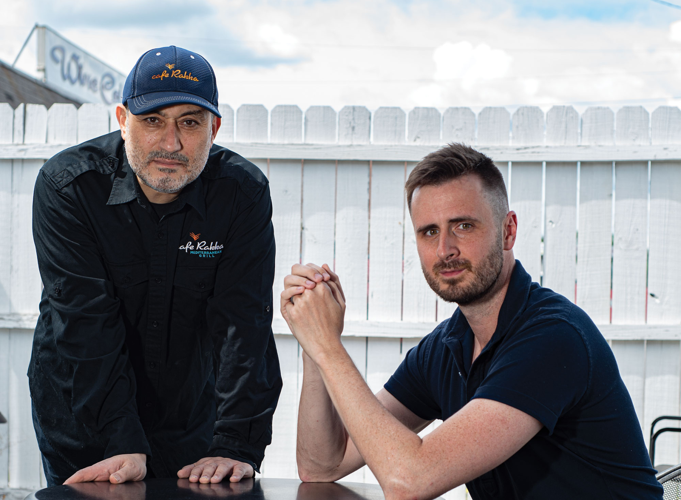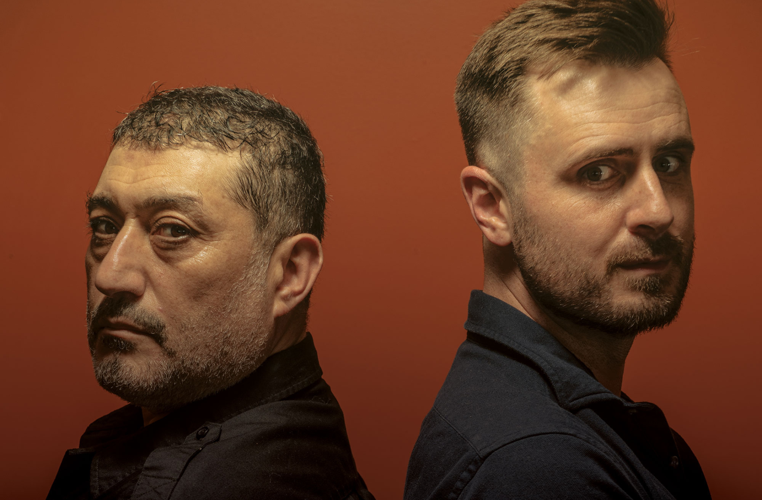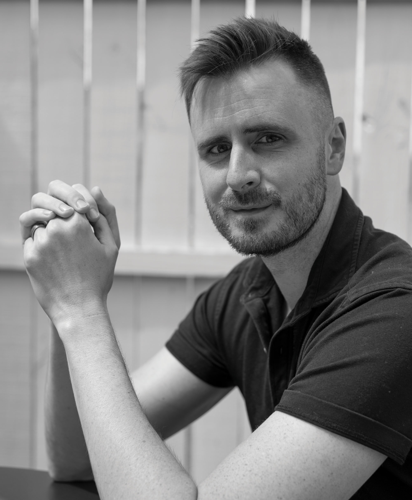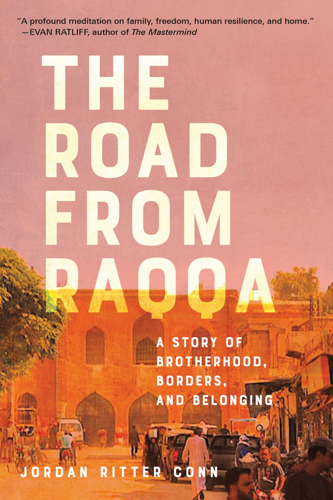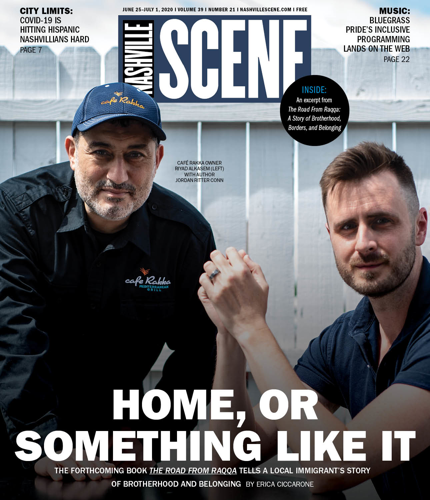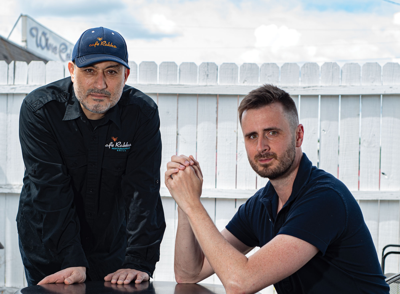
Café Rakka owner Riyad Alkasem (left) with author Jordan Ritter Conn
At Café Rakka in Hendersonville — a small restaurant just a short drive north of Nashville — Riyad Alkasem serves up bottles of homemade tea, hummus and muhammara in colorful bowls, lamb yakhni and shawarma on the sajj. It was here in January 2016 that journalist Jordan Ritter Conn met Alkasem for the first time.
Over the next few years, Alkasem would tell Ritter Conn the remarkable story of his life, beginning in Raqqa, the Syrian city founded by his ancestors. As a journalist, Ritter Conn has spent his career finding stories in which sports are intertwined with international affairs. He’s reported from the Ivory Coast in the aftermath of that country’s civil war, and from South Sudan just before it declared independence.
In The Road From Raqqa: A Story of Brotherhood, Borders, and Belonging — available from Random House imprint Ballantine Books on July 21 — Ritter Conn tells the story of Riyad and his brother Bashar, and the story of Raqqa, which became the so-called capital of the Islamic State group from 2014 to 2017. The brothers were children during the devastating Hama massacre of 1982, when the Assad regime killed thousands of civilians less than 300 kilometers from their home. They took two different paths as the civil war continued. Riyad, with an idealistic spirit, opted to travel to America and “become an expert on its constitution, and then he would bring that knowledge back home.” Bashar, a pragmatist, stayed in Syria and pursued law, confident that he could “navigate his country’s corruption” to serve the common good. Both reckon with their choices throughout their lives as they seek to establish a sense of home.
The Scene spoke with Ritter Conn about The Road From Raqqa. Find our conversation below, followed by a brief excerpt from the first chapter of the book.
How did you meet Riyad and find this story?
I used to work for the site Grantland. It was part of ESPN. And in the very last months before that site was shut down, I’d begun reporting in Southern Turkey along the border with Syria, on a story about a group of soccer players who were basically trying to form an anti-Assad national team … to kind of represent the Syrian revolution. It was my first time reporting on Syria in any capacity.
I was beginning that story in late 2015, and then Grantland was shut down. I got kicked over to ESPN The Magazine, and they wanted me to keep reporting and to go back [to Syria]. In between those two trips, I needed to do some phone interviews. … I was a little bit at a loss, because the people I’d been interviewing mostly didn’t speak English. … My hope was to find someone local who would call with me to some of these sources and basically translate some interviews for me.
My wife teaches religion at Belmont, and she’s become good friends with Rashed Fakhruddin from the Islamic Center of Nashville. … He recommended that I go to Café Rakka, and he said that Riyad would be able to help me. … I went up there and met with Riyad, and he helped me translate those interviews. And then we ended up just talking for hours and kept in touch for a while after that. I ended up writing about his experience of the 2016 election for The Ringer. … The more he told me about his family and about Bashar, the more I felt like there was really a book here.

Jordan Ritter Conn
At what point did you know this was something you wanted to write? Was Riyad encouraging?
I remember very early on, his wife Linda off-handedly, almost jokingly, made a comment about me writing a book about Riyad. And honestly, at that point, it had already been in my mind … for most of 2015, but I did not talk to him about it until after I wrote about him for The Ringer. I think after I wrote that story, he was able to see what it would be like to have some intimate pieces of his life portrayed in this way. And after that, I mentioned to him this idea of doing a book, and he was on board and excited right away.
I love how the prologue tells the story of the founding of Raqqa, laying out the brothers’ ancestry and their deep-rooted connection to the city and the land. Why did you begin the book with this?
Certainly as a storyteller, I also felt like it was really a valuable tool, but talking to him, his sense was always that any story about Raqqa needs to include this story of its founding, the story that he and his siblings heard growing up. And that any story of Raqqa is incomplete without that history. … The fact that they come from the founders of the city, it just felt that in telling their story, I needed to tell that history as well, because it was so critical to the way in which they told the story of the family themselves.
As the book progresses, we learn about Riyad’s own struggles, which are common to many immigrants in America — to assimilate and then also to hold onto one’s culture and roots. Can you speak to that?
I think immigrants come to this country for so many different reasons, but Riyad’s reasons had to do with being in a classroom at the University of Aleppo and learning about our system of government, learning specifically about our system of checks and balances. He had this deep belief that this must be what makes America what it is, this system, and that he desperately wanted to experience it himself, to learn about it. Potentially, his real dream was to eventually move back to Syria and try to reform the government in a way that made it feel closer to the system that we have here. … He held onto and has continued to hold onto this deep kind of faith in a lot of our institutions.
He quickly realized that a lot of aspects of our culture can be corrosive and hostile toward a lot of people, but toward immigrants specifically, and specifically toward Muslim immigrants and Arab immigrants. He encountered that through slurs both before and after 9/11. He encountered it when Bashar actually spent some time living with him in Southern California. And in the wake of 9/11 during the special registration program, Bashar was detained for several days and eventually marked for deportation. [Riyad has] encountered it in California and again in Tennessee, with starting his restaurant in Hendersonville and dealing with a lot of welcome at first, but also some hostility and some suspicion. I think over time, his views of this country have been complicated quite a bit by his own experience.
What do you hope that readers will take away from this book?
I wrote this story because it was a story that’s grabbed me. It felt very powerful when it was told to me both the first time I sat down with Riyad and heard it in its very broadest outlines … again and again over the years that I spent sitting with him, sitting with others who know and love his family, and going to Germany and spending the week with Bashar, [his wife] Aisha and their children. … I wrote this book only because the story grabbed me and moved me as they were telling it to me.
I just hope that other people connect to the power of their story, connect to the resilience in them, both to the bonds that they have with one another and to the bond that they have with Raqqa, and to the ways in which they have worked to make other places — in Riyad’s case by choice and Bashar’s because he was forced to do so — to make other places feel like their home.

What follows is an excerpt from the book The Road From Raqqa: A Story of Brotherhood, Borders, and Belonging by Jordan Ritter Conn, set for release July 21. Copyright © 2020 by Jordan Ritter Conn. Published by Ballantine Books, an imprint of Random House, a division of Penguin Random House LLC. All rights reserved.
The war zone spread out beneath him, a sheet of darkness pocked with light. Riyad Alkasem was tired. His black hair was matted, the curls greasy and flat. He’d been in transit for nearly twenty-four hours, unable to sleep for several days. Now he stared out the window, feeling the plane make its final descent, and he took comfort from the fact that up here all appeared calm. Just below the plane lay Gaziantep, Turkey, a city once known for its baklava, now known as the final stop on the way into Syria’s civil war. It was March 2013. Just south of Gaziantep there stretched a border, about five hundred miles long, running from the Mediterranean Sea and snaking across the Tigris and the Euphrates, following stretches of the Baghdad Railway and the Orontes River. On one side, Turkey. On the other, Syria. And somewhere south of that border, where the war had now been raging for two years, was Riyad’s destination.
Raqqa. Home, or something like it.
He didn’t know why he was going, not really. Sure, he had an answer when people asked. His family was in danger. They needed his help. It sounded simple when phrased in those terms, as if the pull across continents were no more than obligation, a dutiful son and brother looking out for his own. There was something else, though, some tug he’d felt ever since the war began. Sometimes he would lie awake in his quiet home in his quiet Tennessee town, next to his southern-belle wife and just rooms away from his two American sons, and he would wonder if it had been worth it to remain here, if America’s promise had delivered all he had hoped that it would. He couldn’t imagine life without his wife or his boys, but sometimes he imagined them all living out a different story, back in the city he still called “my soul.”
For nearly a month, he’d heard that rebels were closing in on Raqqa. He called his brother Bashar multiple times each week. Every day at the restaurant Riyad owned in Tennessee, he took breaks from running the kitchen to scroll through Facebook, reading news from friends and family and from anonymous pages run by citizen-journalists. For Bashar and the rest of the Alkasems, the war lived at their doorstep. It lived in their streets and in their schools, in their children’s voices and their own bodies. Yet Riyad’s war raged in his mind and in his pocket, haunting him but eluding his grasp. It was a fight he experienced, mostly, by staring at his phone.
But not anymore. Because eventually Bashar quit answering. And eventually the Facebook updates stopped. And one day Riyad found a video online from the main square in the center of the city, just footsteps from his family home. On his screen, he saw the familiar palm trees, the same vast sky, the drab government buildings that had been the backdrop to so much of his childhood. And there in the middle, he saw the same statue that he’d walked by so many times in his life, the one of former president Hafez al-Assad, wearing a suit and a flat smile. As a teenager, Riyad had hated that statue, hated that man. Now he hated the former president’s son and successor, Bashar al-Assad, the architect of Syria’s war. So he held a mix of awe and terror as he stared at the video on his phone and watched thousands of revolutionaries filling the square, arms aloft and screaming. A few took axes to the statue’s foundation. They wore blue jeans and windbreakers, hair gel and gaping smiles. Some carried machine guns. All watched as Assad’s stone body came unmoored, as he toppled, dumbly, straight forward to the ground. They shouted Allahu Akbar (“God is great”) and Suriyah! Hurriye! (“Syria! Free!”). Some removed their shoes and used them to slap Assad’s body. Others swung axes and chipped away at his head. A few celebrated by firing bullets into the sky.
This was historic. For the first time since the Assad regime took power in 1971, it no longer ruled Raqqa. Rebels had taken the city. Riyad’s home had wrested free of the dictatorship he’d so long despised. But as he watched, sitting awake one night six thousand miles away, he found himself unable to revel in the regime’s failures, incapable of connecting to the tears of ecstasy he saw from men on the screen who looked like younger versions of himself.
He thought only of his family, of the order that had now been lost and the violence that would surely grow. Raqqa was free, yes, but now it was more dangerous than ever. Riyad called. Still no answer. He checked Facebook. Still no updates. His portals into the life of his city had been closed. With the government ousted, Raqqa had gone dark.
His wife, Linda, watched him plodding through the rhythms of daily life. At home and at the restaurant, he seemed vacant, a husk. Gone was the energy of the man who’d built a life from nothing here in America. His eyes had gone red, his face pale. Often in conversation, his gaze drifted away. This was still the man she’d married, yes, but right now, she knew he belonged somewhere else.
“Go,” she said.
Three days later, Riyad boarded a plane.
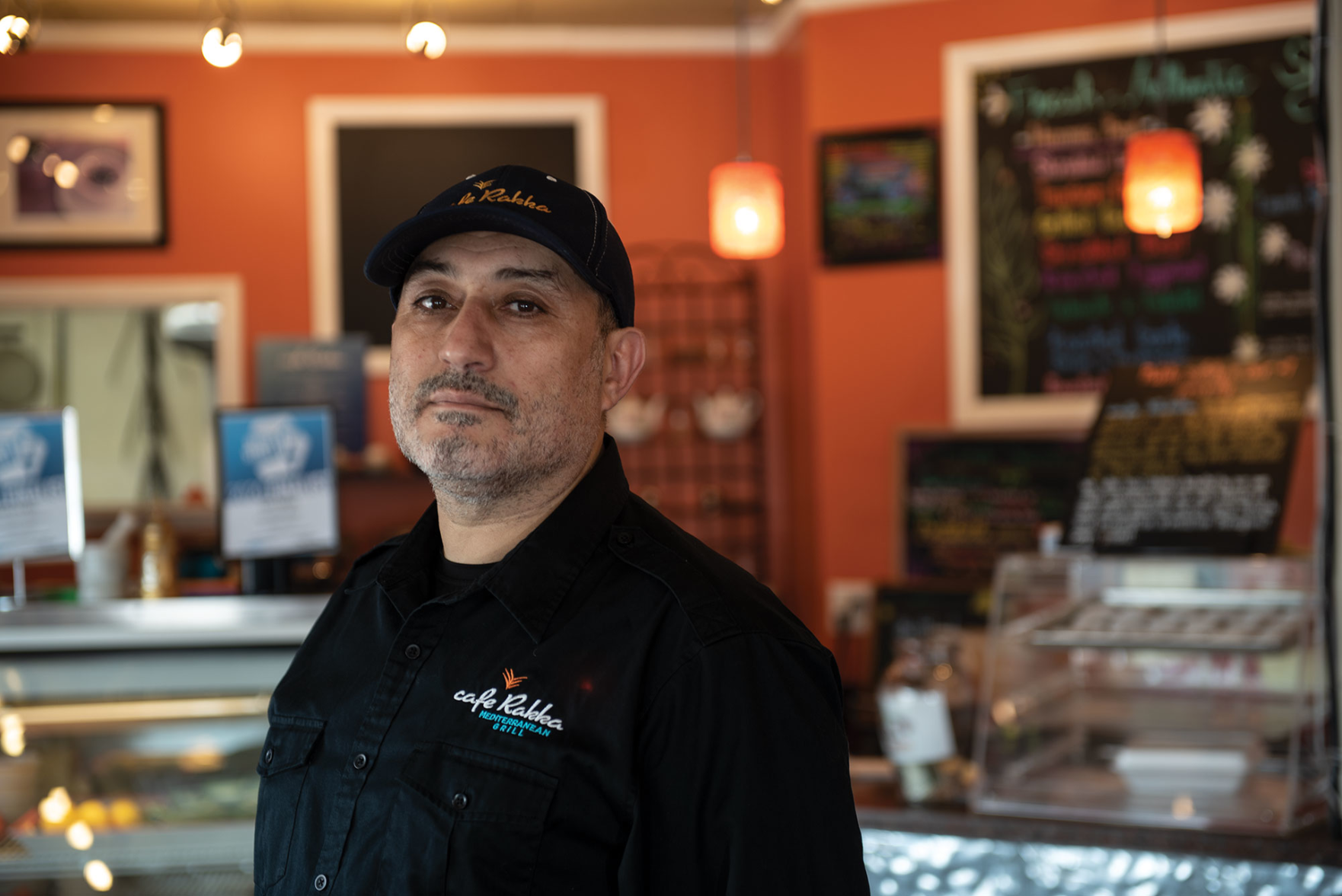
Riyad Alkasem
THE FLIGHT FROM ISTANBUL carried diplomats and journalists, politicians and spies. Even here, ten thousand feet in the sky, the air crackled with a strange and hypnotic energy. Every passenger seemed stitched together by shared purpose. Some would stop in Gaziantep, while others would cross the border and head for their homes, and still others would make their way to the battlefield. Each had a destination with its own proximity to the awaiting violence. But for now, they traveled as one, all headed toward the fight.
Riyad didn’t know what he’d find when he arrived. His family didn’t know he was coming. His phone calls had never gone through, and he hadn’t been able to find a way to deliver a message, so now he was on his way to his childhood home, completely unannounced. He carried some sense that he could help, but the particulars remained unclear. Maybe he’d pay to smuggle his family out of Raqqa. Maybe he’d tend to any of them who had been wounded or, God forbid, make funeral arrangements if someone was killed. Or maybe, if they were in danger, he would fight. He was a Syrian, after all. In military camps as a kid, he’d learned his way around weapons.
The plane approached the runway. Sometime before it touched down, Riyad wondered if he should buy himself a gun.
LATER THAT NIGHT, he settled into a motel room in the town of Karkamış, yards away from the border, surrounded by police and their dogs. Karkamış was a nothing town, a barely there place, home to three thousand residents and a refugee tent camp, little more than a way station on the path to the war. On a hard mattress under a thick blanket, he slept.
The flags stood high the next morning, flapping at each other across an imaginary line. Just above Riyad, there was Turkey’s white star and crescent, bathed in red. Yards away, on the Syrian side, he saw the green and black flag of Syria’s rebels. Elsewhere he knew he’d find the flags of Kurdish nationalists and of hard-line Islamist brigades, along with the one he’d grown up under, that of the Assad regime. All these flags marked their own swaths of land, all across his country. Syria was a puzzle, its pieces melting into one another all the time.
The sky was clear, the air cool. The land around Riyad was bathed in morning sunlight, giving the brown dirt a reddish tint. He walked toward the border, passed by Peugeots spewing exhaust and carrying foodstuffs. Near the gate, he saw a group of children, mostly boys. They were aged twelve or maybe fourteen, and they huddled together smoking cigarettes and laughing, teasing one another in Arabic. Syrians, he realized. Refugees. Riyad approached. He said hello, and the boys said nothing. He asked how they were, and they said nothing still. They wore T-shirts and jeans, flip-flops and vacant stares. They carried homemade shanks crafted from toothbrushes and blades and twine.
He asked about their lives in the camp, and they shrugged. He asked if they went to school, and they laughed. One boy mentioned that sometimes a teacher came to give them lessons, but they usually chose not to attend. “We’re going to be men soon,” he said. “We don’t need school.”
The boys felt familiar and foreign all at once. Their accents sounded much like his own. They were just a few years younger than his own sons, Kasem and Sammy, both in school back home in Tennessee. Kasem was eighteen, about to head off to college at East Tennessee State. Sammy was sixteen, a sophomore at the local Catholic school, already learning to work in the kitchen like his dad. They carried Syrian blood but lived American lives. They looked to Riyad so much like the boys who stood before him right now.
But these boys held a detached anger that felt foreign to Riyad. When he first moved to America, during his years living in Los Angeles, he’d grown accustomed to the rage of the young and dispossessed, the stares from kids that made him lock his windows and clutch his wallet or scan his surroundings for a way out. He’d never felt that in Syria, though. As a kid he’d seen violence, but it was always tribal, ordered. These boys carried the promise of something different, a rage that held no place in Riyad’s version of his country. Any one of them, he thought, looked like they would kill him for a dollar.
“You shouldn’t smoke,” he told the oldest boy, and the boy laughed.
“You can’t tell me what to do.”
THE LINE AT THE CROSSING was short. Riyad had both his American passport and his Syrian state ID in his bag, each to be used at its appropriate time. On this side of the border, it felt expedient to identify as American. The Turkish were tiring of the endless flood of refugees into their country. By showing himself as a citizen of the United States, Riyad proved he was different from most Syrians these guards encountered every day.
The guard took Riyad’s passport and flipped through its pages, looking up here and there to inspect Riyad’s face. Seconds passed in silence. Finally, he placed it on the table before him, peered upward, and asked Riyad, “Where are you going?”
“Raqqa.”
“What is your business in Raqqa?”
“I’m going to see my mother.”
The guard exhaled and shook his head. He paused for a moment, not yet willing to stamp Riyad’s passport. “People are fleeing your country every day,” he said. “You know that?” His eyes narrowed. “They are leaving because if they don’t leave, they will die.”
Riyad nodded. “I know,” he said. “I know. That is why I have to go see my mother.”
“Don’t you think your mother wants you to be safe?”
Riyad said nothing, and now the guard’s voice went soft. “Tell me the truth. Is someone pressuring you to go there? Are you in danger?”
Riyad smiled and shook his head. In truth, Riyad was the only person on earth who believed this journey was a good idea. The guard stamped his passport, but then left his booth to follow Riyad all the way to the gate. He pointed southeast, through the craggy and flat desert, toward the place where the Euphrates grew fat and poured its way deeper into the Syrian plains.
“There is a road,” the guard explained, “that runs along the river to the tomb of Suleyman Shah.” Shah was the grandfather of Osman I, founder of the Ottoman Empire, and though he was buried in Syria, his tomb remained Turkish property. The guard told Riyad that as long as he stayed on that road between the border and the tomb, Turkish police had authority to enter Syria on his behalf. The moment he went beyond the tomb, though, Riyad was on his own. The guard gave him a phone number to call if he needed help.
“Why are you doing this for me?” Riyad asked.
“Because,” the guard said, “you’re an American.”
Riyad crossed the border. He reached into his bag for his Syrian government-issued ID and placed it in his wallet. Then he took his American passport and tucked it in a pouch that he hung around his neck, buried underneath his clothing, against his skin. On this side of the border, it could only bring him danger.

Café Rakka owner Riyad Alkasem (left) with author Jordan Ritter Conn

